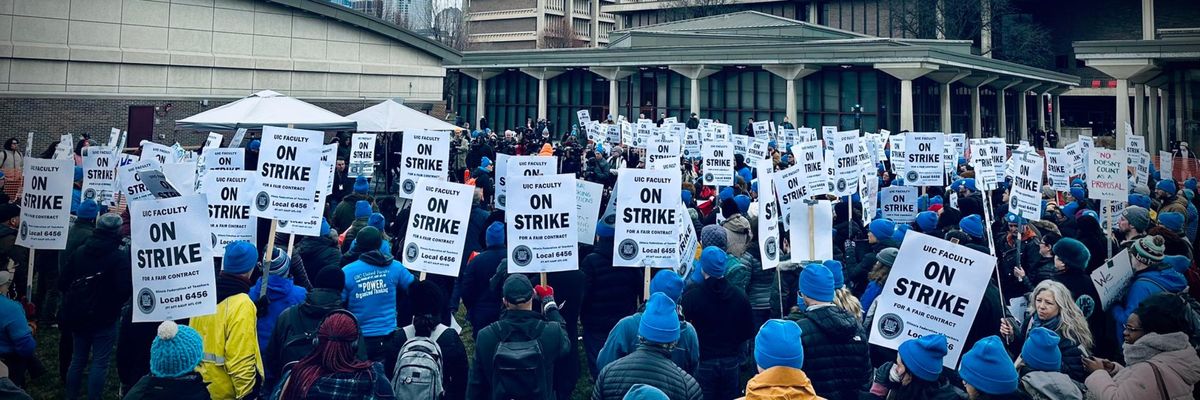Hundreds of University of Illinois Chicago faculty members went on strike Tuesday after nine months of deadlocked contract negotiations over pay and student mental health resources.
The approximately 900 members of the UIC United Faculty union have been working without contracts since August. In November, 97% of the 77% of faculty who voted opted to strike. The union announced late Monday that its members would walk off the job the following day after a marathon 12-hour negotiation session failed to produce a deal.
“We started bargaining this contract back in April, and we've made some progress since then. But we have not won yet," UIC United Faculty president Aaron Krall toldBlock Club Chicago.
According to the Chicago Sun-Times:
The union is striking for higher minimum salaries, bigger pay raises that match inflation, mental health support for students, better job security for non-tenure track faculty, learning disability assessments for students, and more.
The UIC administration is offering raises of 17% over four years, averaging 4.25% per year, the union said. That figure is composed of merit raises and other specific pools of raises that do not apply to all union members across the board.
Union leaders called that offer insufficient, and said "seven years of record enrollments and over a billion dollars in unrestricted reserve funds" was "evidence that the university can afford to take demands for faculty raises seriously."
"The campus is thriving, but many faculty are not," UIC United Faculty negotiator Nicole Nguyen said in a statement. "We have spent the past three years scrambling to mitigate the effects of the pandemic, and our whole community—students and faculty—are exhausted. Management needs to invest in resources that strengthen our entire community."
Some UIC faculty also say they are working more to help students deal with mental health issues.
"I surveyed my students on the first day of class and asked what they perceived as the biggest challenges in need of intervention. Almost all listed mental health," Michael H. Pasek, an assistant psychology professor at the school, tweeted last week. "It's no wonder faculty... are about to strike over students' mental health resources."
Interim UIC chancellor Javier Reyes and acting provost and vice chancellor for academic affairs Karen Colley called the strike "disappointing" and "not in the best interest of the university or our students."
"UIC values the faculty for their key role in upholding and championing the university's academic mission," Reyes and Colley said in a joint statement. "Based on the shared principles between all involved, the university remains optimistic that a fair and beneficial bargaining agreement can be achieved."
Speaking in support of the striking faculty, Randi Weingarten, president of the American Federation of Teachers, asserted that "if we care about kids' academic success, if we care about their future, it is vitally important on this campus to have the mental health support and the other diagnostic testing and other support they need to thrive."

